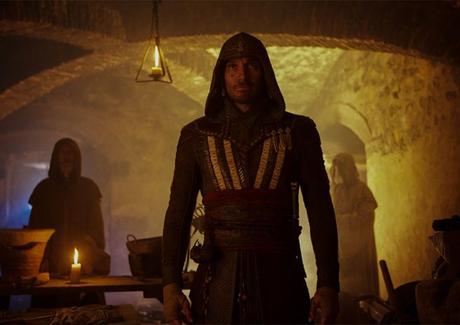
We work in the dark to serve the light. We are assassins
Based on the hugely successful video game series of the same name, Assassin’s Creed (directed by Justin Kurzel) follows Michael Fassbender’s Callum Lynch, a criminal sentenced to death but saved from his execution by Sofia Rikkin (Marion Cotillard), a scientist who works for the mysterious Abstergo Foundation.
She heads an experiment designed to tap into a person’s genetic history and view events from centuries ago, thanks to a machine called the Animus. Abstergo’s aim is to find the final resting place of the Apple of Eden, which Callum’s ancestor Aguilar, an assassin in 15th Century Spain, holds the key to locating.
What unfolds is a centuries old battle between the Templars and the Assassins, the latter a secret body tasked with protecting the Apple from the Templars who seek to use it to enslave mankind.
Convoluted plot aside, Assassin’s Creed does show some respect to its source material, with several of the game’s more iconic aspects – the ‘Leap of Faith’, assassinations and villains included – unlike some other adaptations which abandon any fidelity to the source.
Unfortunately, that’s about as good as it gets. The torturous plot is not helped by a number of thin characters that are disappointingly dull. Fassbender’s Lynch is a violent man who’s not particularly sympathetic in any way; whatever charisma the actor naturally conveys appears to have been sucked into a void.
There’s a moment where he cracks a grin that’s one of few moments of levity. Otherwise the whole film, from its leaden, thunderous direction to the sterile art direction could use more vibrancy, more humor and a sense of fun.
The film does at least make an attempt at depth though the results are predictably shallow. Cotillard’s Sofia believes science has the potential to change the world for good, skirting the more ethical and moral implications of her work; conflict arises when her father Rikkin (Jeremy Irons), puts pressure on her to finish the job but that’s as much depth as she gets.
Both her character and Fassbender’s are curiously hampered by such (for the most part) inert characters and they certainly aren’t helped by what feels like a lack of chemistry between the two, all the more surprising given how good they were in Kurtzel’s Macbeth.
With such a dull interpretation, you’d hope the action scenes could offer some redemption but they are lamentably poor, affected by chaotic editing that churns out an unintelligible maelstrom of fists, feet and knives.
A few moments are clever (Aguilar kills someone by rebounding an arrow off a wall), and there are some beautifully choreographed stunts, but these moments are few and far between.
In the end, the feeling Assassin’s Creed leaves you with is a hollow one. It has a high concept premise with plenty of ideas to explore, but the struggles to make an impression. The lack of humor and serious tone leave it open to accusations of being dour.
In its final moments it attempts to set up a sequel that, based on the evidence of the preceding two hours, it has done nowhere near enough to earn. It deserves to join other adaptations on the video game scrapheap.
5/10
Advertisements